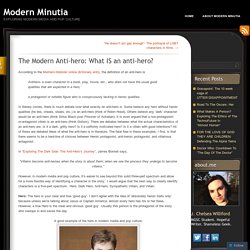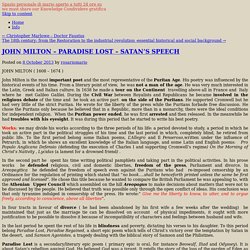

The Modern Anti-hero: What IS an anti-hero? According to the Merriam-Webster online dictionary entry, the definition of an anti-hero is Antihero- a main character in a book, play, movie, etc., who does not have the usual good qualities that are expected in a hero; a protagonist or notable figure who is conspicuously lacking in heroic qualities In literary circles, there is much debate over what exactly an anti-hero is.

Some believe any hero without heroic qualities (he lies, cheats, steals, etc.) is an anti-hero (think of Robin Hood). Others believe any ‘dark’ character would be an anti-hero (think Sirius Black post Prisoner of Azkaban). It is even argued that a non-protagonist-or-antagonist villain is an anti-hero (think Gollum). Lessons Worth Sharing. Macbeth: Act 3, Scene 6. The history of Christmas and how it began. I.

When was Jesus born? A. Popular myth puts his birth on December 25th in the year 1 C.E. B. The New Testament gives no date or year for Jesus’ birth. C. A. B. C. D. E. F. Santa Claus - Christmas. Rudolph, “the most famous reindeer of all,” was born over a hundred years after his eight flying counterparts.
The red-nosed wonder was the creation of Robert L. May, a copywriter at the Montgomery Ward department store. In 1939, May wrote a Christmas-themed story-poem to help bring holiday traffic into his store. Using a similar rhyme pattern to Moore’s “‘Twas the Night Before Christmas,” May told the story of Rudolph, a young reindeer who was teased by the other deer because of his large, glowing, red nose. But, When Christmas Eve turned foggy and Santa worried that he wouldn’t be able to deliver gifts that night, the former outcast saved Christmas by leading the sleigh by the light of his red nose.
Satan%20Hero%20or%20Anti hero. Sympathy for Milton's devil. Don't tell Richard Dawkins, but the devil is back in business.

The cloven-footed one is popping up all over the place on celluloid – from the "who-the-hell-are-you? " elevator shenanigans in M Night Shyamalan's Devil to the animal ripping antics of Eli Roth's The Last Exorcism. To be honest, I've never been that convinced by hammy horror depictions of Old Nick. All that head-spinning and low-octave retching seems so OTT. But I do have quite a soft spot for charming devils. If you're not convinced, let me tempt you with a secondhand book I picked up recently – Muriel Spark's The Ballad of Peckham Rye. Satan. Probably the most famous quote about Paradise Lost is William Blake's statement that Milton was "of the Devil's party without knowing it.

" While Blake may have meant something other than what is generally understood from this quotation (see "Milton's Style" in the Critical Essays), the idea that Satan is the hero, or at least a type of hero, in Paradise Lost is widespread. However, the progression, or, more precisely, regression, of Satan's character from Book I through Book X gives a much different and much clearer picture of Milton's attitude toward Satan.
Writers and critics of the Romantic era advanced the notion that Satan was a Promethean hero, pitting himself against an unjust God. Most of these writers based their ideas on the picture of Satan in the first two books of Paradise Lost. In those books, Satan rises off the lake of fire and delivers his heroic speech still challenging God. In essence then, Milton's grand poetic style sets Satan up as heroic in Books I and II. Spazio personale di mario aperto a tutti 24 ore su. John Milton is the most important poet and the most representative of the Puritan Age.

His poetry was influenced by the historical events of his time. From a literary point of view, he was not a man of the age. He was very much interested in the Latin, Greek and Italian culture. In 1638 he made a tour on the Continent travelling above all in France and Italy where he met Galileo Galilei. Heroes, Superheroes & Anti-Heroes. Heroes, Superheroes & Anti-heroes JD Hancock via Compfight 1.1: Book Report 3.1 Shakespeare’s life, the Elizabethan theatre & parts of a tragedy Quiz on 1- You need to know key elements of Shakespeare’s life.

Shakespeare: The Rise of the Anti-Hero. A lot of TV is dark these days.

Some of television’s most celebrated shows over the past 10 years have taken us deep into the shadiest, seediest—and sometimes scariest—areas of our world, fantasies, and the human psyche. And you know what? Apparently, we love it. Walter White vs. Macbeth. “…the common man is as apt a subject for tragedy in its highest sense as kings were… if the exaltation of tragic action were truly a property of the high-bred character alone, it is inconceivable that the mass of mankind should cherish tragedy above all other forms, let alone be capable of understanding it.” ~ Arthur Miller, “Tragedy and the Common Man,” 1949 FIFTEEN YEARS AGO I wouldn’t have argued that any television drama could stand alongside classic literature.

I know, there are great shows we all like to watch again and again: I Love Lucy, All in the Family, M*A*S*H, but since HBO’s groundbreakingThe Sopranos, television drama has entered a golden age. Much like the serial novel which reached heights of popularity in the Victorian era, weekly TV drama has dedicated followers. Either binge-watching or in delayed gratification, viewers are addicted to the episodic fix. The story lines stretch beyond the torrid affairs and soapy manipulations of gasping daytime entertainment.